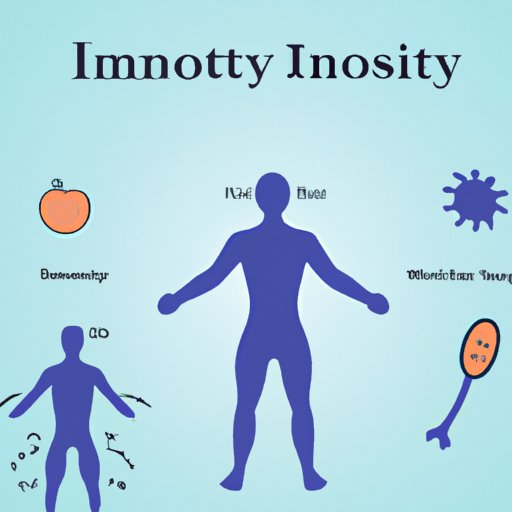Overview of the Immune System
The immune system is an incredibly complex network of cells, organs, and proteins that work together to protect the body from infection and disease. It is the body’s natural defense against bacteria, viruses, fungi, and other harmful substances.
So, what is the immune system and how does it work? The immune system is composed of several specialized cells, tissues, and organs that work together to fight off foreign invaders. When the body is invaded by a pathogen, such as a virus or bacteria, the immune system kicks into gear and releases specialized molecules called antibodies. These antibodies bind to the antigen, which is a molecule found on the surface of the pathogen, and neutralize it. In this way, the immune system is able to protect the body from infection and disease.
The main functions of the immune system are to recognize and respond to foreign invaders, eliminate them, and remember them in case they reappear. It also helps repair damaged tissue and maintains homeostasis. In addition, the immune system plays a key role in the body’s ability to heal itself.

Anatomy of the Immune System
The immune system is composed of several different types of cells, organs, and proteins. The most important components are white blood cells, lymph nodes, spleen, thymus, bone marrow, and tonsils. Each of these components plays an important role in the functioning of the immune system.
White blood cells, or leukocytes, are the main players in the immune system. They are responsible for recognizing and attacking foreign invaders. There are two main types of leukocytes: B-cells and T-cells. B-cells produce antibodies that bind to antigens and help to neutralize them. T-cells recognize infected cells and either destroy them directly or signal other cells to do so.
Lymph nodes are small, bean-shaped organs located throughout the body. They filter out bacteria, viruses, and other foreign substances. The spleen is a large organ located near the stomach that filters out old and damaged red blood cells and platelets. The thymus is a small organ located behind the breastbone that produces T-cells. Bone marrow is a soft tissue located inside bones that produces new blood cells. Finally, the tonsils are small glands located at the back of the throat that help to trap bacteria and other pathogens.
Types of Immunity
There are two types of immunity: innate and adaptive. Innate immunity is the body’s natural, non-specific response to foreign invaders. This type of immunity is present from birth and does not change over time. Adaptive immunity, on the other hand, is acquired through exposure to a foreign invader. This type of immunity is specific to the invader and can become stronger over time.
Innate immunity is composed of physical barriers, such as the skin and mucous membranes, as well as chemical barriers, such as antimicrobial proteins. These barriers act as the first line of defense against foreign invaders. If these barriers are breached, the body’s second line of defense is activated: the inflammatory response. This response involves specialized cells and proteins that act to eliminate the pathogen and repair any damage caused.
Adaptive immunity is composed of two main components: B-cells and T-cells. B-cells produce antibodies that bind to antigens on the surface of the pathogen and neutralize it. T-cells recognize infected cells and either destroy them directly or signal other cells to do so.
Common Diseases
A weakened immune system can lead to a variety of illnesses and infections, including the common cold, influenza, pneumonia, and even cancer. A weakened immune system can also make it more difficult for the body to heal itself after an injury or illness.
Signs and symptoms of a weakened immune system include frequent infections, fatigue, weight loss, fever, and swollen lymph nodes. If you experience any of these symptoms, it is important to talk to your doctor to determine the cause.
Boosting Your Immune System
There are several ways to boost your immune system and keep it healthy. Eating a balanced diet that includes plenty of fruits, vegetables, whole grains, and lean proteins is essential for a strong immune system. Additionally, getting regular exercise, reducing stress levels, and getting enough sleep are all important for maintaining a healthy immune system.
Supplements, such as vitamin C, zinc, probiotics, and omega-3 fatty acids, can also help to support a healthy immune system. However, it is important to speak to your doctor before taking any supplements to ensure they are safe and effective for you.
By following these simple tips, you can keep your immune system strong and help prevent illness and infection.
(Note: Is this article not meeting your expectations? Do you have knowledge or insights to share? Unlock new opportunities and expand your reach by joining our authors team. Click Registration to join us and share your expertise with our readers.)
